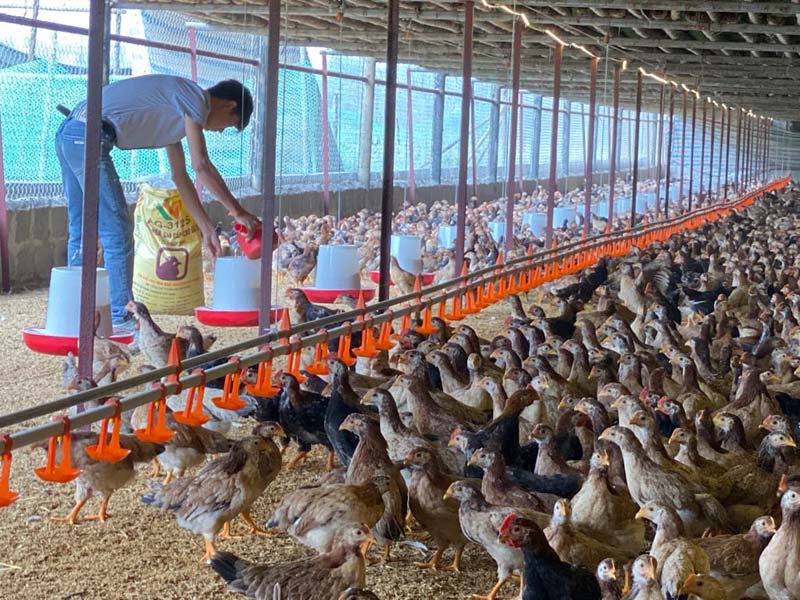
(HBO) – Tens of thousands of farmers in the northern mouantainous province of Hoa Binh are seizing a golden opportunity from surging demand for not only pork but also other meat, such as chicken, beef and goat which are also experiencing jumping prices ahead the upcoming Tet (Lunar New Year) Holiday.

Minh Duc chicken
farm in Bot village, Phu Thanh commune, Lac Thuy district, earns billions of VND from livestock products.
Buffalo and cow
farms across the province have seen great opportunities from growing market
demand while the prices are steadily increasing. It is predicted that the
consumption of chicken, beef, buffalow meat will continue rising next year.
Local farmers have
diversified livestock products and focused on producing alternatives of pork in
the wake of current shortage of pork. They have paid more attention to
enhancing quality of their meat products to promptly supply to the market,
contributing to maintaining the growth of local agriculture and improving
incomes.
According to the provincialStatistics Office, Hoa Binh now
has 119,000 buffaloes, 86,200 cows,
489,000 pigs and nearly 7.6 million poultry heads. This year, the province produced 3,600 tonnes of
buffalo meat, 3,200 tonnes of
beef, 63,000 tonnes of pork, 23,200 tonnes of poultry meat and over 96 million
eggs.
With the
diversification of livestock products, focusing on strong products, replacing
pork in the current market shortage of pork, local farmers actively take care, improve product
quality to supply the market at the right time. Since then, contributing to
maintaining the general growth of the agricultural sector, increasing income
for farmers.
In 2019, though
the output of pork plunged as a consequence of African swine fever outbreak, the cattle herds grew stably as farmers shifted to cattle
for meat production. Production of local specialty chickens in Lac Son and Lac
Thuy expanded, bringing high profits to farmers thanks to the products’
high-quality meat and stable prices. Goat herds also grew as the goat farming
is relatively easy, requires low investment and generates high profits.
Additionally,
consumers’ demand has shifted to alternative meats like beef, chicken and goat,
instead of pork, allowing farmers to earn profits./.
According to data from the Hoa Binh Provincial Party Committee, the industrial production index for the first six months of 2025 is estimated to have increased by 20% compared to the same period last year. This marks the highest year-on-year growth rate for this period since 2020.
In the first six months of 2025, Hoa Binh province’s export turnover was estimated at 1.145 billion USD, marking an 18.11% increase compared to the same period in 2024. Import turnover was estimated at $ 804 million, a 17.15% increase, which helped the province maintain a positive trade balance.
The lives of the ethnic minority farmers in Tan Lac district have gradually improved thanks to the new directions in agricultural production. This is a testament to the collective strength fostered through the professional associations and groups implemented by various levels of the district’s Farmers’ Union.
With the motto the "product quality comes first,” after nearly one year of establishment and operation, Muong village’s Clean Food Agricultural and Commercial Cooperative, located in Cau Hamlet, Hung Son Commune (Kim Boi district), has launched reputable, high-quality agricultural products to the market that are well-received by consumers. The products such as Muong village’s pork sausage, salt-cured chicken, and salt-cured pork hocks have gradually carved out a place in the market and they are on the path to obtaining the OCOP certification.
In the past, the phrase "bumper harvest, rock-bottom prices" was a familiar refrain for Vietnamese farmers engaged in fragmented, small-scale agriculture. But today, a new spirit is emerging across rural areas of Hoa Binh province - one of collaboration, organisation, and collective economic models that provide a stable foundation for production.
Maintaining growing area codes and packing facility codes in accordance with regulations is a mandatory requirement for agricultural products to be eligible for export. Recently, the Department of Agriculture and Environment of Hoa Binh province has intensified technical supervision of designated farming areas and packing facilities to safeguard the "green passport" that enables its products to access international markets.



